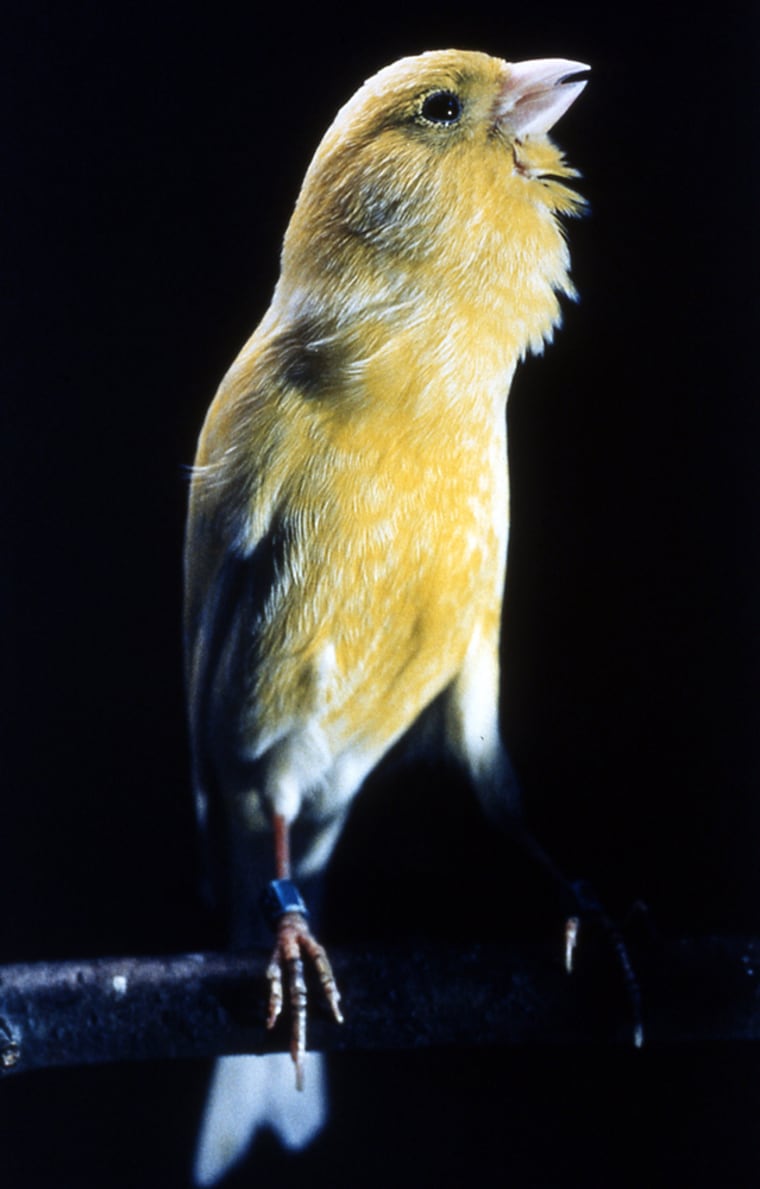Young canary males can be tempted to sing songs that do not sound very canarylike, but as breeding season approaches, maturing canary males transform their biologically untested songs into tried-and-true canary tunes capable of charming females, scientists have found.
During the first half of their youth, male canaries raised alone in soundproof cages can learn to precisely imitate computer-generated songs. As spring nears, however, the canaries literally “change their tune” by reorganizing the structure of their songs so that they conform to the rules of adult canary songs and the expectations of potential mates.
This new study appears in Friday's issue of the journal Science, published by AAAS, the nonprofit science society.
This unexpected discovery of youthful vocal flexibility in a songbird species known for its regimented and non-flexible songs in adulthood suggests new ways that freedom and rules are both involved in canary singing.
The work may also provide insights into the more general phenomenon of “vocal learning” in which humans as well as some birds, whales, porpoises and perhaps bats learn to make sounds by either imitation or improvisation.
While singing, songbirds rearrange defined units of sound to form different phrases in a way that parallels the human process of rearranging the sounds of different letters to form words. These vocal learning similarities allow scientists to study canaries in order to investigate speech in new ways.
Songs of courtship
A bird’s songs express an emotional state, perhaps something similar to a piece of instrumental music that conveys a message without words, according to Science author Timothy Gardner, who conducted the research while at Rockefeller University in New York.
Through their songs, birds proclaim their species identity, breeding status, health and individuality.
Male canaries with large song repertoires boast about their leisure time to potential mates.
“Short of driving a Mercedes-Benz, it’s what a bird can do to say ‘I’m such a good finder of food that I have the time to make these long songs,’” explained Rockefeller University's Fernando Nottebohm, another author of the Science research.
As the spring breeding season nears and the days grow longer, a male’s songs encourage a female canary’s transition from hunter-gatherer to mother-to-be. This transition includes mating, egg laying and nest building.
“In a very real sense, the male is charming the female with his songs,” said Nottebohm.
How scientists bent the rules
In light of the critical importance of birdsong to reproductive biology, the scientists tempted young male canaries to sing biologically inappropriate songs to test the extent to which the birds would imitate rule-breaking songs. The researchers recorded the birds’ every chirp and whistle from birth until their first breeding season. They ran thousands of songs and sounds through computer programs and determined what songs the canaries were singing.
Twelve of the 16 young male canaries raised in isolation and exposed only to the “synthetic songs” accurately perceived, memorized and imitated the rule-breaking songs, which were much longer than those typically sung by canary adults.
The researchers' synthetic songs broke an important rule from the canary songbook: In the fake songs, each sound or syllable differed from the syllable before and after it. Natural canary songs, in contrast, are known for their back-to-back repetition of the same sounds.
As the days grew longer and the canaries approached both sexual maturity and breeding season, they began to self-edit and rearrange their songs so that they fit into the proper canary song format. This reshaping occurred despite the fact that the synthetic songs continued to play in the background.
With a boost of testosterone and artificially longer days, canaries will “change the tune” more rapidly and completely, the authors found.
“This really turns on its head the idea that canaries and other songbirds with rule-driven songs are equally constrained by rules in their youth,” said Gardner, who is currently at the Massachusetts Institute of Technology in Cambridge.
As adults, the birds raised on synthetic songs also surprised the researchers when they rapidly switched back and forth between rule-breaking and traditional songs.
“It’s almost like they were singing in two languages with different grammar systems at the same time,” said Nottebohm.
What does flexibility sound like?
The scientists found it fascinating that canaries have so much vocal flexibility in their youth. But if you went searching for flexible, rule-breaking young soloists among the approximately 4,000 species of songbirds the in the wild, you’d likely be disappointed.
Aside from mockingbirds and other birds that mimic others as a biological strategy, songbirds, even in their youth, seldom sing the songs of other birds or burst into rule-breaking improvisations.
The imitations of the rule-breaking synthetic songs are likely restricted to experimental situations because animal communication systems are built to prevent the mistakes the researchers induced.
Signaling your identity as a species is serious business. If you don’t get it right you’re not going to get a mate, Nottebohm explained.
Despite the biological safeguards in place, the researchers managed to temporarily throw a wrench in the birds’ song system by keeping the canaries in isolation and only providing them with rule-breaking songs.
The scientists expected to find strong limits to the kind of songs young birds could memorize and imitate. Instead, they discovered a temporary stage of extreme vocal flexibility that transitions into a rule-driven adulthood. The rules are a safeguard meant to ensure that the males will sing the songs that will allow them to find a mate and defend territory.
